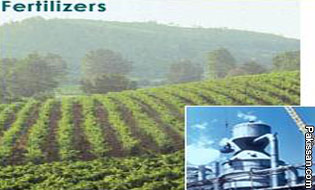FAISALABAD (July 18 2009): The Federal Government has decided to establish Agricultural Products Marketing and Processing Infrastructure on the basis of the experience of world's best infrastructure holding agriculture marketing countries.
According to Planning Commission sources, this project aims at providing food security, ensuring farmer's profitability, reduction of post-harvest loses, and access to premium national and international markets by integration of value chain system of farms' inputs, outputs and finance and implementation of quality standards. The proposed investment would be divided into three major areas of farm supplies and services, grain infrastructure, and perishables infrastructure
 In order to increase crop production for fulfillment of malnutrition requirements of the day by day increasing population, the systems is relying exclusively on the use of chemical fertilizers. Whereas, it is also proved that use of chemical fertilizers and other pesticides has caused tremendous harm to the environment by pollution and contamination in water and soil and common men are suffering by many means, because of the situation. Therefore, increase in population, environmental pollution, contamination in water and soil is the major concerns in today's world and there is a reason to search for alternative methods of increasing plant production in an eco-friendly manner, the adequate management of natural, renewable resources and the reduction of chemical inputs.
In order to increase crop production for fulfillment of malnutrition requirements of the day by day increasing population, the systems is relying exclusively on the use of chemical fertilizers. Whereas, it is also proved that use of chemical fertilizers and other pesticides has caused tremendous harm to the environment by pollution and contamination in water and soil and common men are suffering by many means, because of the situation. Therefore, increase in population, environmental pollution, contamination in water and soil is the major concerns in today's world and there is a reason to search for alternative methods of increasing plant production in an eco-friendly manner, the adequate management of natural, renewable resources and the reduction of chemical inputs. 
